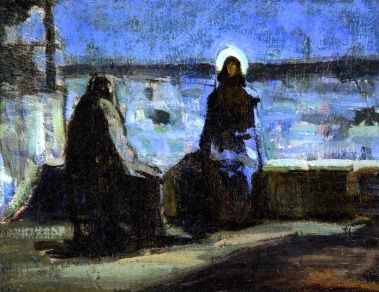Jesus answered him, “Truly, truly, I say to you, unless one is born again he cannot see the kingdom of God.” (John 3:3)
Several years ago a parishioner recommended that I watch The Walking Dead. I found season 1 mildly entertaining, but could never understand why there was a 2nd season. How many stories can you tell about people who think they are alive, but are actually dead?
Jesus didn’t use the word “zombie,” but he seemed to have a category for religious people who do not realize they are spiritually dead.

Nicodemus Visiting Jesus, Henry Ossawa Tanner
Jesus has a late night conversation with Nicodemus, a Pharisee, who recognizes that Jesus was sent by God (John 3:2). Rather than affirm Nicodemus for his insight, Jesus bluntly tells him that he is spiritually dead and needs to be brought to life (John 3:3). Pharisees were the most religious group at that time. They took prayer and purity very seriously. Nicodemus was not just a member of this group – he was a leader. And Jesus says he is a walking, religious dead person.
This isn’t the only time Jesus used this category. He used it when he spoke with a would be disciple in Luke 9:59-60, and to describe the prodigal son in Luke 15:24. They were spiritually dead, and needed to be brought to life.
Nicodemus devoutly practiced his faith and taught other people how to, but he was among the walking, religious dead. He didn’t need to improve his religion, he needed new life. He needed to be born again.
We can be a faithful Baptist, Methodist, Lutheran or Catholic and still be among the walking, religious dead. To those, Jesus would say, “You don’t need a new or improved religion, you need a new life. You need to be born again.”
The prophet Ezekiel provides a wonderful image of becoming spiritually alive (36:26-27):
I will give you a new heart and put a new spirit in you; I will remove from you your heart of stone and give you a heart of flesh. And I will put my Spirit in you and move you to follow my decrees and be careful to keep my laws (36:26-27).
The heart of stone is unresponsive to spiritual truth, the need for repentance, the power of Jesus Christ and the glory of God. In the new birth, God replaces our heart of stone with a heart of flesh. Our dead, spiritual boredom with Christ is replaced by a heart that responds to spiritual truth, experiences the healing power of Jesus, and lives a life that glorifies God.
Since the way we experience all of this is through faith, the walking religious dead are invited, in the name of Jesus and by the power of his Spirit, to receive Christ as the sin-forgiving, life transforming Lord of their lives.


Pingback: Are There Zombies in the Church? - HUNTINGTOWN UNITED METHODIST CHURCH